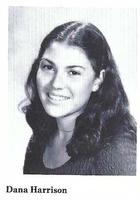
Remembering Dana Harrison, influential Bay Area arts leader
By Ann Brody Guy
Dana Harrison, a leader in the Bay Area arts community, including Burning Man, theater and dance, died peacefully on March 9 at her home in Berkeley, surrounded by family and friends. She was 57 years old. The cause was a rare and quick-moving cancer, said her brother, Michael Harrison of Oakland.
Dana Lynn Harrison was born Nov. 19, 1960 in Bryn Mawr, Pennsylvania. Gifted with a precocious and rigorous intellect, she graduated high school at 16 and Princeton University at 20. She moved to the Bay Area in 1981, where she pursued a corporate career at Bank of America, then Charles Schwab. Her talent for business and finance earned her numerous professional accolades and promotions. Notably, she was lead project manager for the mid-1990s build and launch of e.Schwab, Charles Schwab’s highly successful shift into online trading and brokerage services.
But Harrison found corporate life an uneasy match for her creative and free spirit. Her love of art, theater, and dance — and costume-focused experiential communities like the Grateful Dead and Burning Man — pulled her toward more personally meaningful pursuits. A pivotal event — getting struck by a car that ran a red light — spurred a life reckoning. She left the corporate world in 1998, and put her business skills to work for Burning Man.
“Dana joined us at a time when the organization was just gaining its confidence,” said Marian Goodell, CEO of Burning Man Project and one of the event’s six co-founders. The organizers quickly recognized their new volunteer’s sharp eye for process and her experience in creating money-management systems. Dubbed “Biz Babe” and invited onto senior staff, she created the event’s first formal ticketing structure, modeled after the Grateful Dead’s process.
Following that success, “We just handed her more — the café, the commissary, ice, decor — she made us buy cash registers and created cash-handling procedures with accountability. She showed us that you lose money if you don’t manage money,” Goodell said. Those systems were foundational — none were ever dismantled, though some, like ticketing, have evolved, Goodell said, adding that Harrison always worked with fairness and common sense in mind. “We all knew she had a big heart, so she was always coming from what was fair and what was right.”
It’s Harrison’s big heart that left the strongest mark on the organization. “She had a great way of delivering information that made people feel comfortable making the changes she recommended,” Goodell said. “Her leadership set an example for the staff for how to manage people and treat team members — she was gentle and kind but firm.” People throughout the organization sought her out to navigate personal and organization challenges, Goodell said. “They trusted her to be generous in her thoughts and her spirit. She came to us as a manager and ended up as a goddess and a spiritual guide.”
In 2008, Harrison formed her own production company to mount “How to Survive the Apocalypse,” a Burning Man-centered rock-opera that brought together her love of Black Rock City’s eccentric, freewheeling creativity with her passion for opera and theater. A limited run in San Francisco and a related production in Los Angeles both sold out, expanding the culture to a broader audience.
Next, Harrison became managing director of Theater Bay Area, the service organization that supports more than 350 performing arts companies in nine counties. Executive Director Brad Erickson called her four-year tenure “transformational. She revamped and revised our financial structures and processes. She brought a firm hand and leadership role to running our operations — to how the organization, the staff, and the board all worked together,” he said. Harrison flipped the usual script of theater managers who are trained as theater artists and pick up business and finance skills on the fly, Erickson said. “There was just a level of professionalism that she brought from her years at Schwab and in the banking world… it was something we hadn’t had before.”
Harrison’s impact extended beyond operations. “She was fervent that we need to be serving audiences and as well as theater makers,” Erickson said. The new strategic direction, a turn from group’s focus solely on service, resonated with the theater community, he said. “She was tapping into something that the field really wanted. Theater-makers understood that there was this bigger mission.”
As the organization’s community liaison, Harrison spearheaded a volunteer group looking at gender inequities across theater. “They were watching how many female playwrights were bring produced, something that local theaters simply hadn’t done before,” Erickson recalls. Within just a few years, even theaters long married to traditional male-dominated canons were producing seasons equally split between male and female playwrights, he said. The group’s gender tracking extended across casting, directing, and design, creating awareness that gave rise to progress.
On personal level, Erickson said he’ll miss the long early-morning and late-night conversations with his friend and colleague. “Having that kind of thought partner was a real joy. Her energy and passion were contagious.”
Harrison’s other notable projects included investing her personal and time and nest-egg to develop the Noodle Factory, a West Oakland live-work-performance space serving low-income dancers and theater artists in the early and mid 2000s. She also donated both money and time to Community Partners International, a nonprofit that addresses health challenges in conflict-affected regions of Southeast Asia, including spending two months on the Burmese border setting up management and reporting systems for the group’s innovative “Backpack Medics” program.
Most recently, she became associate director, then executive director of the Ridhwan Foundation, a Berkeley-based spiritual education institute that she studied with for several years and held in high regard.
Harrison’s life choices and rich personal relationships, together with her study of Ridwhan’s Diamond Approach teachings, helped bring her great clarity and peace when faced with a sudden terminal diagnosis, said her brother Michael.
“Dana used her business savvy and natural leadership ability to make a huge impact on the Bay Area’s cultural scene, and she shook her booty while doing it,” he said. “She lived an audacious life, right up until the end, when her home hospice turned into a loving, reverent, and often raucous celebration of her life. She was a model for my kids, and for so many others, on how to live and how to die.”
The March 20 San Francisco Board of Supervisors Meeting was adjourned in Harrison’s honor.
In addition to her brother Michael and sister-in-law Amy Smith, and their children Abigail and Eli, Harrison is survived by her sister and brother-in-law Julia Matheson and Tim Slagle and their children Matthew and Adam, of Washington D.C., her mother, Roslyn Harrison, of Westfield, NJ, and her mother’s long-term companion, Irving Hilsenroth. Harrison is also mourned by a circle of longtime friends she proudly called “intentional family,” as well as by scores of close friends, community members, colleagues, mentees, and neighbors.
“Dana’s superpower was making a deep connection with each person who came into her life,” her brother said. “The love, laughter, and friendship she created will reverberate forever.”
A memorial event is currently being planned. Check her Caring Bridge site for an announcement.
http://www.berkeleyside.com/2018/03/29/remembering-dana-harrison-influential-bay-area-arts-leader

